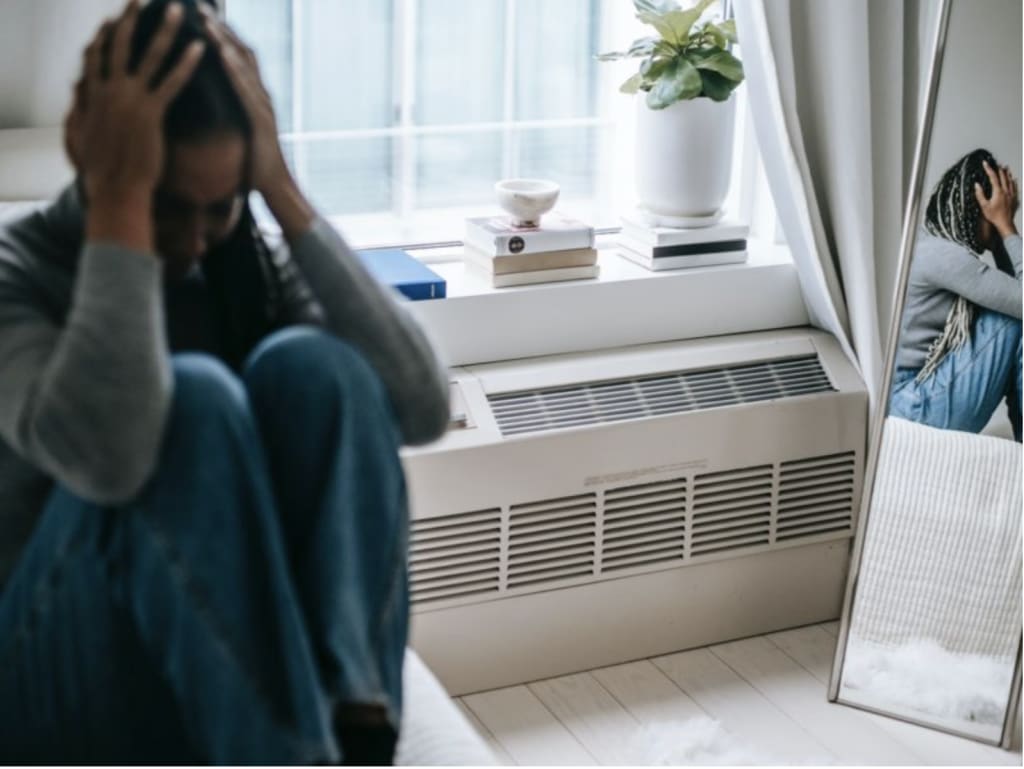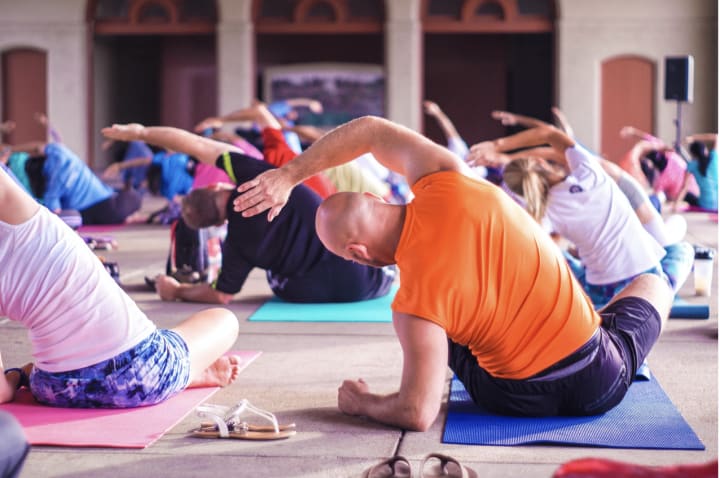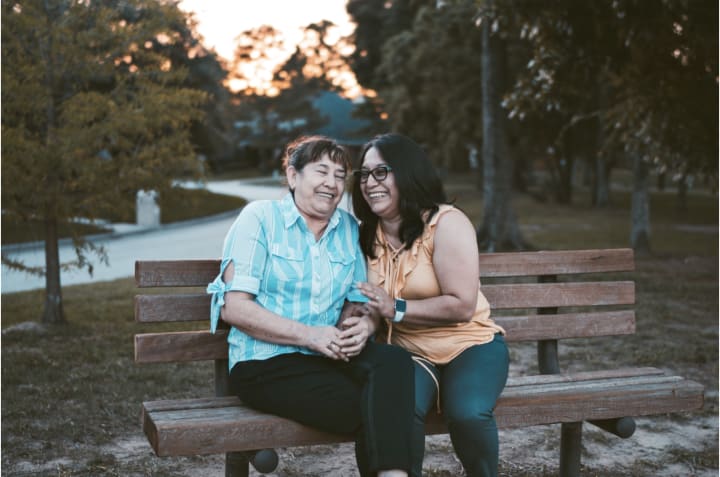Seven ways to rest
Feeling weary? Sleep not helping? Discover the seven types of tiredness, and how to recover from them

We get all tired and weary.
And sometimes sleep – essential though it is – just isn’t enough to bring us back to ourselves. We’ve all been carrying an especially heavy load over the past two years. So it’s time to recognise that tiredness comes in many shapes and forms, and that the recovery for each might be slightly different.
It’s not always about lying on the sofa or taking a nap. Sometimes a run or a workout can energise us more. Meeting up with a friend can be just the break we need, or a meditation session might give us back our balance and focus.
In her book Sacred Rest, Dr Saundra Dalton Smith identifies the seven different kinds of rest we all need. Do you recognise any of these?
Physical rest
Signs that you need physical rest. You just don’t have the physical energy to get through everything you need to do in a day. You’re tired, but you can’t get off to sleep. You have frequent colds and minor illnesses, muscle pain and soreness. You’re using caffeine, sugar, or other stimulants to give you the energy you need. Then you perhaps alcohol, pills, or comfort food to wind down.
And what to do about it. We all know how to recognise physical exhaustion, though we often push through it. Sometimes even a brief period of stillness can help. Try lying on your back on the floor, for instance, and tensing, then relaxing each part of your body in turn. Then close your eyes, and just quietly observe your breath for a moment.
But our bodies can also tire of not being used. If you have a sedentary job, the best way to reenergise might be a brisk walk or some sort of aerobic exercise. If you’ve been carrying heavy gear, small children or a lot of tension, or if your work involves being in the same position for long periods, you might find the relaxation and rest you need by doing yoga, Pilates, or some simple stretches.
Research has shown that exercising lightly for just 20 minutes, three times a week reduces the symptoms of fatigue dramatically, and people feel more energised within six weeks of starting this. If you’re exhausted, get moving. It might be a better cure than another Netflix binge session.

Mental rest
Signs that you need mental rest. You don’t have the mental energy to get through everything you need to do in a day. Focus feels hard, and you are easily distracted. You often feel overwhelmed, and feel frustrated or irritated when thinking about your day. If you try to do important tasks or focus on your creative work, you suddenly feel drowsy or go into a mental fog. You get snappy about nothing and are easily triggered.
Your internal chatter is particularly loud, with your inner critic dominating and carping. Unhelpful thoughts repeat on loops. Perhaps you’re also doing a lot of time travel: constantly reliving past events or worrying about things that haven’t even happened yet. You never feel quite present, here and now.
What to do about it. Meditation can help enormously, just quietly observing your breath or being aware of the thoughts passing through your mind instead of getting tangled up in their stories.
Create a refuge or happy place you can go to, in your mind, for peace and space.
Notice tasks that drain you and find ways to get rid of them or reduce them as much as possible. Then block draining tasks together and get them done in one go. Build in a reward of some sort and recovery time afterwards.
Emotional rest
Emotions are contagious. When we do a lot of emotional labour, we need to recuperate for a while, to regain our balance. Perhaps we’re taking on the problems of others, or our job involves constantly dealing with people in a heightened emotional state.
Perhaps we have been in a situation where we can’t feel what we’re feeling, where we obliged to repress our emotions. Or we’re in a space where we can’t always be our authentic selves. Both are exhausting.
Signs that you need emotional rest. You can only see your own failures and flaws. Self-doubt and insecurity prevent you from trying new things, or anything you really want to do. Sorry seems to be your favourite word, and every statement you make has some sort of qualifier attached to it. You beat yourself up for even minor mistakes, and you’re constantly anxious or worried. When you think about your life, you feel depressed or angry.
What to do about it.
- Spend as much time as you can with happy, positive people. Hang out with friends who make you laugh or feel good about yourself. Notice the people who drain you, who are always negative, and examine whether you really need to be around them. If you do, schedule time to recover afterwards.
- Sometimes, we just need to be held. Ask for a big, tight, long hug. Or give yourself one. (It’s a known stress reliever.)
- Take some time to really feel into whatever you’re feeling. You might not know what emotion is, at first. It might just be a tightness, a heaviness, a knotted feeling. Where is it in your body? Get curious. Does it have a colour, a sound, a vibration? Is it moving or still? Do you need to release it? (Laugh, cry, shout, dance, punch a pillow?) Sit with it. Really examine it, with curiosity rather than judgement. Is it changing as you observe it? Does it have a message for you?
- Be vulnerable. Whatever it is you feel you can’t always reveal—difference, trauma, beliefs—there will be others who are the same as you, or who’ve been through similar things. Find them. Spend time with them. Share your stories.
- It’s exhausting wearing a mask all the time. We all need a few close relationships with people who love and accept us, with all our quirks, kinks and flaws. If you already have these people, cherish them. If you don’t, look for them. You are not alone.
Social rest
We are social animals and for millions of years, we needed the strength of our tribe to survive. People need people. (Someone should write a song about that one day.) This is as true for introverts as it is for extroverts, even if we do also need time alone to recharge.
When researching places with the most people who live to the age of 100 or more, scientists found that diet, exercise and environment all have a big impact. But community and friendships matter most of all. People with strong social connections live longer, cope with stress better, and are healthier and happier.
We all need to feel seen, understood, accepted.
Signs you that need social rest. You feel lonely, detached from family and friends. You are attracted to people who mistreat or abuse you. Making friends is difficult, as is maintaining close relationships. You deliberately isolate yourself from others, and perhaps prefer online relationships to meeting in real life.
What to do about it. Make the effort to meet people face-to-face and notice how it feels. One great conversation with a friend is worth 1000 emojis and likes on social media. If you really can’t meet up (and that’s been an issue for all of us in the pandemic), a proper one-on-one conversation on the phone or via Zoom will fill you up far more than tweets and memes.
Listening deeply to others can be a wonderful way of realising you’re far from alone with your fears, your anxieties, your quirks.
Learn what social activities energise you. As an introvert, on the middle of the dancefloor in a crowded club, surrounded by people and feeling part of something bigger than myself; but also oddly private, as no one is really watching you dance in the dark. Now that I’m older, it’s more about a long walk with a close friend or sharing a meal with a small group of people.

Spiritual rest
This is something many of us feel uncomfortable exploring. But we all need something bigger than ourselves to believe in.
It can be about religious faith. But it can also be about connecting with nature, our community, a mission, or cause. For me, it’s a woolly but comforting notion of a benevolent universe that has my back when I’m aligned with my values and purpose.
Signs that you need spiritual rest. You feel empty, unsatisfied with whatever you accomplish. You can’t get motivated. Life feels grey, difficult, lacking colour or magic. You feel hopeless, helpless, trapped, defeated—and there are no benevolent forces ready to help out. You’re depressed, numb, apathetic. Nothing you do will make a real difference anyway, so why bother?
What to do about it.
- Go back to your big why. Reconnect with your values, what you want your life to mean and what you want your work to do in the world.
- Meditate. Pray. Read the work of the great philosophers—religious or otherwise—and consider what you believe.
- Practice gratitude. Every morning or night, in bed, list three things you’re glad of.
- Notice happy coincidences when they occur. The train leaving five minutes late when you were running behind. A parking space that opens up just as you arrive at your destination. The exact paint/fabric/phrase/riff you need, coming exactly when you needed it. Thank the universe for this, and ask for more.
- Give a gift every day. Smile at a stranger. Help a harassed parent get their buggy onto a bus or up a step. Hold a door open for an elder. Compliment someone on their work. Send a postcard to a friend. Send a fan letter/tweet/comment to someone you admire.
- Examine the rhythms and rituals in your life, from how you celebrate holidays and birthdays to how you start and finish your day. See if they still serve you and change the ones that don’t. Mark the passing of the seasons. Have a ritual for starting and finishing work. For arriving home. Bring some magic, some fairy dust to everyday life.
Sensory rest
We live in a world of constant stimulation and noise. We are never bored, rarely still. There’s always a screen, an alert, a message to distract us. Every day, our senses are assailed by traffic and crowds, advertising and loud entertainment full of car chases and explosions.
Signs that you need sensory rest. Adverse reactions to loud sounds. Blurry vision, or eyestrain. You dislike being hugged or touched. Unable to taste natural foods, you instead crave sugar, salt, fizzy drinks and fatty processed food. You’ve become desensitized to smells others seem aware of. Rich sensory experiences like fireworks or concerts feel overwhelming.
What to do about it.
- Unplug from everything, just for a while. No screens, devices. Switch off your email and alerts. No films or TV.
- Try creating a quiet corner in your home, a place to read, sit, daydream. Never sit there to look at your phone or any other screen. Treat is as a haven, a place of peace.
- Test your responses to different sensory inputs. It may be, after a day of noise, that you find more rest listening deeply to music than sitting in silence.
- Reactivate your senses with a scented candle or bath, flowers or essential oils.
- Experiment with soft fabrics next to your skin, a soft blanket or velvet cushion.
- Drink only water for a while, until it feels refreshing again. Or cut out all processed foods until you can again enjoy the crisp sweetness of an apple.
- Get out into the fresh air and breathe deeply.
- Go into the woods and try the Japanese practice of shinrin-yoku – forest bathing. Quietly and mindfully resting our senses in a natural environment can soothe and heal.

Creative rest
Our creativity has its rhythms and cycles. And every year has its winter. We need to accept this, allow ourselves fallow periods: times to read, explore, rejuvenate.
Signs that you need creative rest. You focus on the needs of others, never your own. Self-care feels selfish, indulgent, something you don’t yet deserve. So you talk yourself out of it, convince yourself you’ll have earned it if you just do this one more thing (and then another thing, and another). Self-destructive, you deliberately sabotage your own happiness. You don’t feel your work or contribution is valued. You are uninspired, and your creative work feels stale, empty. Or you’re not working at all.
What to do about it. Surround yourself with beauty and seek it out. Go sit in front of a brilliant piece of art for at least 30 minutes. Really look at it and notice how additional details emerge, how your perception of it changes. Take a moment to look at a flower, to marvel at the craft that went into a favourite item, to re-read a familiar poem and discover something new in it. Or go on a play date.
Cultivate awe and wonder. Look up at the stars. Watch the sunset or get up to see the dawn. Stand under a tree and marvel at its age, its beauty—and imagine all the roots and structure underneath it. Walk by a river, a lake, the sea.
Spend time with young children, who are still full of excitement about the everyday world. Or visit a favourite building, garden, place with someone who has never been there before and see it through fresh eyes.
Take sabbaticals, long and short. Take time to travel, read, learn, grow, explore. This is never wasted time. Life is short. Enjoy it!
About the Creator
Sheryl Garratt
Sheryl Garratt is a former editor of The Face and Observer magazines, and has written professionally for more than 30 years. She is also a coach working with creatives of all kinds. Find her at thecreativelife.net







Comments (4)
Surely we have to find new ways to relax.Times are difficult.Good article.
Great tips, thank you. I find that we have a certain amount of willpower to get us through each and every day, and when that is used up on lower stimulating tasks, then we get tired in more ways than one. Social tiredness was a thing when things opened up again after quarantine.
These are great ideas! Sometimes sleep just isn't enough. Thanks for sharing.
I enjoyed this piece.